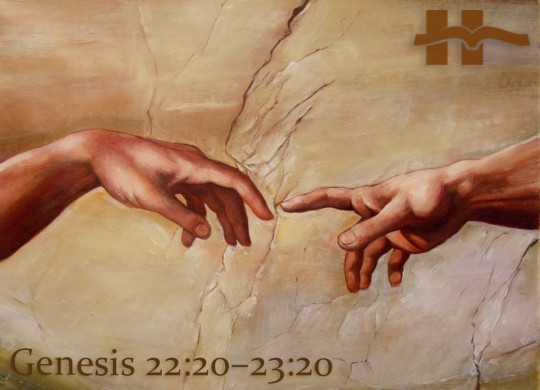Genesis 22:20−23:20

Mature faith persists even when costly, encountering opposition, suffering exploitation, and enduring little reward in the present.
While on the surface the subject of this chapter, the purchase of a burial plot, sounds rather trivial, its mention elsewhere—in connection with Abraham’s burial (25:9–10), with Jacob’s will (49:29–32) and burial (50:13)—indicates its significance to Israelite history and to what God was doing through Abraham. Here in Genesis 23, this landing of property is rendered more important (sixteen verses, 23:3–18, dealing with extensive negotiations and the purchase of property) than even the death, mourning for, and burial of Sarah, which occupy only three verses (23:1–2, 19). Twice the narrative mentions that Hebron, the location of Sarah’s death and burial, is “in the land of Canaan” (23:2, 19). The land motif is significant here. In fact, the final note on Sarah and her burial is followed up in 23:20 with a restatement of the significance of this piece of land the patriarch purchased, confirming the interest of this chapter. For the first time, Abraham is formally and legally a landowner in the Promised Land. God’s promises were beginning to be fulfilled, despite his seeming absence in the story. (There is no mention of God in Genesis 23, except for the Hittites’ labeling of Abraham as a “prince of Elohim” [23:6; here the divine name might simply indicate the superlative—“mighty prince”].)
Altogether, the Hittites seem gracious. But the byzantine negotiations are attempts to deny Abraham’s request: “Give me a achuzzat-keber [= “grave-possession”] among you” (23:4; also 23:9). Achuzzah always means “possession,” and the same word was used by Yahweh in his promise of the land of Canaan to Abraham and his descendants as an everlasting “possession” (7:8; also see 48:4). Essentially, the patriarch desired to inaugurate his possession of land in Canaan in a formal and acceptable way by becoming a landowner.
The Hittites, though, are loathe to grant Abraham, the foreigner, his request to own land, while they are fine with him burying his dead there. In any case, filthy lucre entices the Hittites. And it was quite a load of lucre, too: four hundred shekels of silver (about 10 lbs. of the metal; 23:15). A staggering extortion! Comparable transactions include fifty shekels for the threshing floor of Araunah purchased by David (2 Sam 24:24), seventeen shekels for the field at Anathoth purchased by Jeremiah (Jer 39:9), and six thousand shekels (two silver talents) for the entire hill of Samaria purchased by Omri (1 Kgs 16:24).
One wonders what Abraham must have felt. All those expansive promises from God (12:7; 13:15; 15:18; 17:8; 22:17) but, as he nears the end of his life (he has just lost his first spouse), all he can show for those divine affirmations is a little field with a cave in it, in which he buries his wife! Abraham could have easily avoided all these complications and especially the financial blow he had to suffer. He could simply have gone back to Ur for Sarah’s burial. But his faith is mature, and his trust in God is complete: he would bury his wife in the Promised Land, even if all the promised land that he possessed was just a field with a cave. This, then, is a story of the patriarch’s trust in God—a co$tly faith that continues to trust even when cheated, for God’s plans will come to fruition.
Indeed, the faith of all of God’s children will be costly, demanding much, and often, in this life, there will not be much to show for that expensive (and expansive) exercise of trust in God, in his plans and in his timing.











 Abe Kuruvilla is the Carl E. Bates Professor of Christian Preaching at The Southern Baptist Theological Seminary (Louisville, KY), and a dermatologist in private practice. His passion is to explore, explain, and exemplify preaching.
Abe Kuruvilla is the Carl E. Bates Professor of Christian Preaching at The Southern Baptist Theological Seminary (Louisville, KY), and a dermatologist in private practice. His passion is to explore, explain, and exemplify preaching.
2 Comments
A Jewish friend of mine told me recently that the field in Machpelah is where (by Jewish tradition at least) Adam and Eve were buried.
Have you heard anything like that?
And Moses and Zipporah, they say!